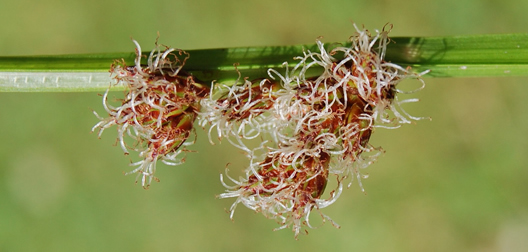UK: Saving the Tamar Tiger - riverside rescue of rare plant
16.06.10
It’s not the most spectacular looking plant, but when it comes to rarity the Triangular Club Rush (Schoenoplectus triqueter) is the UK’s botanical equivalent of the tiger. This unassuming sedge is disappearing fast with the last remaining specimens growing in just a few small clumps beside the River Tamar.
The reason the plant is so close to extinction is not known. Scientists believe it might be due to increased competition from fast-growing reeds or changes in riverbank management. Alternatively it might be due to stormier weather conditions or increased competition from alien waterside plants.

Triangular Club Rush © Tim Rich, National Museum Wales
The UK is the most northerly extent of the Triangular Club Rush’s range. Habitat loss has already seen it disappear from places such as the Thames and Medway. Restricted to the upper reaches of tidal estuaries, the plant has a bright green angled stem and can grow from 50 – 150 cm in height. It flowers in August and September.
A survey of the River Tamar in 2009 revealed the rare sedge is now only found in four distinct clumps near Calstock. The total area covered by these few surviving plants is less than four square metres.
Concerned at the scale of the decline, scientists from the Environment Agency are making a final attempt to save the species with help from Kew Garden’s Millennium Seed Bank, Natural England, the National Trust and ecologist Peter Nicholson from Panscape Environmental Consultants.
The National Trust has given permission for a nursery area to be created at Cotehele where Triangular club rush plants will be specially grown for re-planting at other suitable locations in the estuary. The nursery, at Morden stream, was chosen because it has a suitable habitat offering bank stability, an open aspect and low salinity. The nursery will be managed by National Trust staff from Cotehele.
This latest rescue attempt builds on an earlier project in the 1990s when a number of plants were removed from the Tamar and cultivated by Kew Gardens. Propagated plants from Kew were then planted at selected sites on the estuary in 1997/1998 in a bid to boost a small population of native Triangular club rush around Rumleigh Quay. This work effectively saved the plant from extinction.
Further research and monitoring by the Environment Agency has increased scientists’ understanding of the ecology and habitat requirements of the rare sedge and they are now more confident of the plant’s chances of survival.
"The decline of the Triangular Club Rush is causing serious concern. This is our last chance to save this critically endangered species," said Jess Thomasson of the Environment Agency.
"After careful research we have identified a handful of sites where re-introduced plants will have the best chance of survival. Also, having a reservoir of Triangular Club Rush plants at Cothele will greatly increase the likelihood of success by allowing further planting in historic strongholds on the Tamar."
A few days ago staff from Kew and Wakehurst Place, the Millennium Seed Bank nursery where the plants were grown, travelled down to the River Tamar to deliver the latest batch of Triangular Club Rush to the new nursery at Cotehele.
‘We are delighted to be able to work in partnership with the Environment Agency and National Trust on this important project. The re-planting of new club rush on the Tamar is being supported through the Countryside Stewardship Scheme," said Hugh Tyler for Natural England.
(text from Environment Agency press release)
UK: Rare orchids cut down before seeding
09.06.10
![]() A comedy of errors of tragic proportions has been played out on a roadside verge in Hampshire for the past three summers.
A comedy of errors of tragic proportions has been played out on a roadside verge in Hampshire for the past three summers.
UK IN PICTURES: The New Forest comes alive
26.05.10
![]() Reader Tori Green lives in the New Forest and sent in these quite spectacular images of British flora.
Reader Tori Green lives in the New Forest and sent in these quite spectacular images of British flora.
UK: Kew gives world's smallest waterlily a reprieve
19.05.10
 The tiny 'Thermal' lily, Nymphaea thermarum, with pads as little as 1cm in diameter, has been successfully grown at Kew by expert propagator Carlos Magdalena.
The tiny 'Thermal' lily, Nymphaea thermarum, with pads as little as 1cm in diameter, has been successfully grown at Kew by expert propagator Carlos Magdalena.